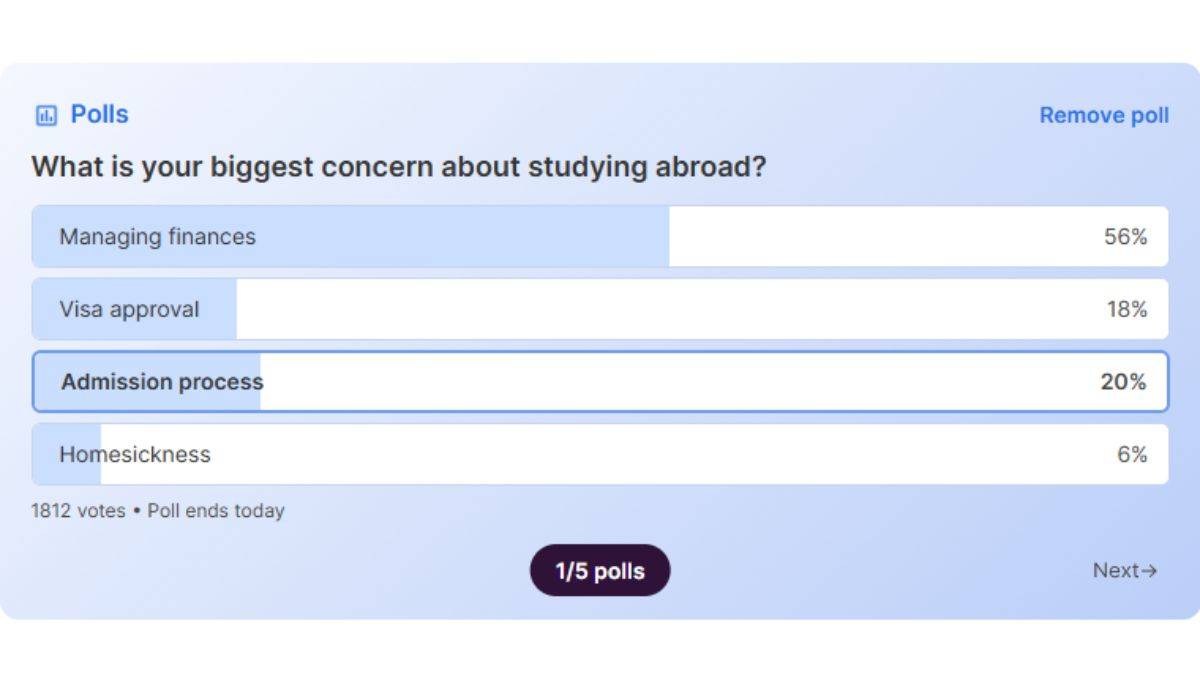Most Common Challenges of Studying Abroad - Insights from 1800+ Students
Studying abroad can totally change your life, but it also bring some challenges. Everyone faces them differently, you might too. If you thinking about studying in another country, knowing them is smart. Recently, more than 1800 students shared what worries them most when they plan to study abroad. These concerns could help you get ready before you leave.
Studying abroad is a big dream for many people; new things to try, good schools, learning more about yourself, and that exciting feeling of starting somewhere new. But with all the fun, there can be some worry too.
We wanted to see what really makes students nervous, so we asked over 1800 students: “What worries you most about studying abroad?” Their answers show pretty clearly what it’s like getting ready to study in another country today.
Now, let’s look at the results and talk about each worry – why it happens, and how you can handle it.
- Poll Summary: What Is Your Biggest Concern About Studying Abroad?
- 1. Managing Finances (56%)
- 2. The Admission Process (20%)
- 3. Visa Approval (18%)
- 4. Homesickness (6%)
- Is Studying Abroad Really Worth It?
Poll Summary: What Is Your Biggest Concern About Studying Abroad?
The poll results based on 1812 votes:
| Managing finances | 56% |
| Admission process | 20% |
| Visa approval | 18% |
| Homesickness | 6% |
1. Managing Finances (56%)
It’s really no surprise that more than half the students in the poll picked “managing finances” as their biggest concern. Let’s face it; studying abroad isn’t cheap. Over the years, the cost of international education has gone up significantly. The tuition fees, rent, daily expenses, and even just the cost of flights and student visa applications for study abroad together act as a lot for any international students planning to study abroad.
For many students, it’s not just about affording tuition; it is about wondering if they’ll be able to survive month to month in a new country. And that’s a heavy load to carry, especially when you're thousands of miles away from home.
Why It’s So Stressful
- International tuition is often 2-3x higher than domestic rates
- Living in cities like London, Sydney, or New York can burn through savings quickly
- Not all countries allow international students to work part-time freely
- Many scholarships are highly competitive or cover only partial costs
What Can Help?
- Start budgeting early – track your spending habits even before moving. Candidates should be aware about how to save money abroad.
- Look into study abroad scholarships that are often under-publicized
- Consider affordable countries to study abroad like Germany, Poland, or Malaysia, where tuition is low or even free
- Speak to current students and ask what they spend monthly – their advice is often more real than any official estimate
Candidates can check the Cost of Living Calculator for Studying Abroad and know details about abroad expenses.
Predict your IELTS, TOEFL, and PTE in just 4 steps!
2. The Admission Process (20%)
Other biggest concern for Indian students is the abroad admissions process. Applying to universities abroad often feels like a job application mixed with a personality test.
From gathering academic transcripts to writing your statement of purpose, booking English proficiency tests, requesting recommendation letters (LORs), and figuring out which portals to use. This is a lot.
Why Students Struggle Here
- Every university has a different system and criteria
- Writing an effective SOP or personal essay can feel intimidating
- There’s a fear of missing deadlines or uploading the wrong documents
- It’s hard to know if your profile is competitive enough
What Can Help
- Create a master checklist for each university – it keeps everything clear
- Ask for feedback on your essays from mentors, professors, or even Reddit communities
- Candidates can check the Shiksha Study Abroad website and connect with the counselors to get better guidance which will help them in their planning to study abroad.
- One should never hesitate to email admissions offices – they’re usually helpful and responsive
3. Visa Approval (18%)
Third biggest concern for students planning to study abroad was visa approval. This is very crucial in a student's study abroad journey. Candidates should be aware of each and every requirement for getting a student visa.
For example, you’ve got your admission abroad, you’ve planned your move, and then suddenly: a visa denial can stop everything. So, candidates should make sure to get their Student Visa process done under their admission deadline to avoid last minute hassle.
4. Homesickness (6%)
You could be sick at heart if you were in that place. Only 6% said homesickness was the biggest worry but that doesn’t mean it’s not real. Sometimes homesickness shows up only after a few weeks or months abroad, when the fun fades and being far from family hits you. Being away from your family, your culture, and places you know can make you feel lonely.
How to Deal with Homesickness?
You should know some ways to stop missing home too much when abroad.
- Talk with people back home, but don’t be on call all the time.
- Join clubs, societies, or cultural groups in your university – meet new friends.
- Make a daily routine, it helps your day feel normal.
- And don’t be shy to see a student counselor – they know this feeling and can really help.
Is Studying Abroad Really Worth It?
This poll gave us some real ideas about what students think. But this doesn't mean that study abroad is not worth it. A quote from Martin Luther King Jr., “You don’t have to see the whole staircase, just take the first step.” Same thing with studying abroad; you don’t need to think of all the problems, just focus on what you’ll get after finishing your studies.
If studying abroad is your dream – keep dreaming, keep planning, and take it one step at a time.
Read More:
Yes, 7.5 is a very good score! It means your English is excellent. Most top universities abroad ask for 7 plus band score. If you have this much band score, you are 100% safe for admission. It also makes your visa profile very strong.
Many people think Writing Task 2 is most difficult part. Also, Academic Reading can be tough because passages are long. You really need to manage your time well to get good band score.
Pick your stage and get free guidance from counsellors who've helped thousands get into top universities.
 Starting research
Starting research Shortlisting colleges
Shortlisting colleges Exam preparation
Exam preparation SOP/LOR writing
SOP/LOR writing Scholarship & finance
Scholarship & finance Visa application
Visa application



Student visa interviews are stressful because a rejection can halt months of preparation. Common fears include saying the wrong thing, missing documents, or not appearing convincing enough. Students should prepare thoroughly using mock visa interviews, ensure their documents are well-organized, and express clear study goals and future plans.